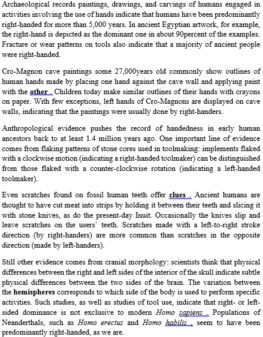Read the following passage and mark the letter A, B, C, or D on your answer sheet to indicate the correct answer to each of the following questions.
Culture is a word in common use with complex meanings, and is derived, like the term broadcasting, from the treatment and care of the soil and of what grows on it. It is directly related to cultivation and the adjectives cultural and cultured are part of the same verbal complex. A person of culture has identifiable attributes, among them a knowledge of and interest in the arts, literature, and music. Yet the word culture does not refer solely to such knowledge and interest nor, indeed, to education. At least from the 19th century onwards, under the influence of anthropologists and sociologists, the word culture has come to be used generally both in the singular and the plural (cultures) to refer to a whole way of life of people, including their customs, laws, conventions, and values.
Distinctions have consequently been drawn between primitive and advanced culture and cultures, between elite and popular culture, between popular and mass culture, and most recently between national and global cultures. Distinctions have been drawn too between culture and civilization; the latter is a word derived not, like culture or agriculture, from the soil, but from the city. The two words are sometimes treated as synonymous. Yet this is misleading. While civilization and barbarism are pitted against each other in what seems to be a perpetual behavioural pattern, the use of the word culture has been strongly influenced by 6 conceptions of evolution in the 19th century and of development in the 20th century. Cultures evolve or develop. They are not static. They have twists and turns. Styles change. So do fashions. There are cultural processes. What, for example, the word cultured means has changed substantially since the study of classical (that is, Greek and Roman) literature, philosophy, and history ceased in the 20th century to be central to school and university education. No single alternative focus emerged, although with computers has come electronic culture, affecting kinds of study, and most recently digital culture. As cultures express themselves in new forms not everything gets better or more civilized.
The multiplicity of meanings attached to the word made and will make it difficult to define. There is no single, unproblematic definition, although many attempts have been made to establish one. The only nonproblematic definitions go back to agricultural meaning (for example, cereal culture or strawberry culture) and medical meaning (for example, bacterial culture or penicillin culture). Since in anthropology and sociology we also acknowledge culture clashes, culture shock, and counter-culture, the range of reference is extremely wide.
Which of the following is NOT true about the word culture?
A. It is a word that cannot be defined.
B. Its use has been considerably changed.
C. It differs from the word civilization.
D. It evolves from agriculture.




Chọn A.
Giải thích: Câu trên làm rõ, nghĩa của từ “culture” trong lĩnh vực nông nghiệp và y học đã được làm rõ.
Đáp án A.
Dịch câu hỏi: Điều nào sau đây KHÔNG đúng về từ culture?
A. Đó là một từ không thể định nghĩa. => Ý này sai với thông tin trong bài
Thông tin ở đoạn 3: “The multiplicity of meanings attached to the word made and will make it difficult to define.” (Tính đa nghĩa của từ gắn liền với từ được tạo ra và sẽ gây khó khăn cho việc định nghĩa.)
B. Việc sử dụng từ này đã được thay đổi đáng kể. => Ý này đúng
Thông tin ở đoạn 2: “Cultures evolve or develop. They are not static.” (Các nền văn hóa tiến triển hoặc phát triển. Chúng không như cũ.)
C. Nó khác với từ civilization. => Ý này đúng.
Thông tin ở đoạn 2: “Distinctions have been drawn too between culture and civilization; the latter is a word derived not, like culture or agriculture, from the soil, but from the city.” (Người ta đã rút ra sự phân biệt giữa culture vàcivilization; từ thứ hai không như từ culture hoặc agriculturebắt nguồn từ đất trồng, mà bắt nguồn từ thành thị.)
D. Nó phát triển từ nông nghiệp. => Ý này đúng.
Thông tin ở đoạn 3: “The multiplicity of meanings attached to the word made and will make it difficult to define.” (Tính đa nghĩa của từ gắn liền với từ được tạo ra và sẽ gây khó khăn cho việc định nghĩa.)